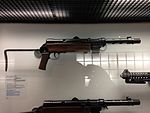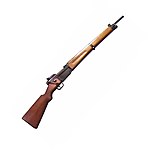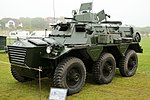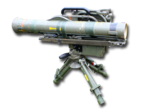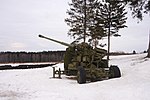Armed Forces of Mauritania
| Armed Forces of Mauritania | |
|---|---|
| الجيش الوطني الموريتاني Armée Nationale Mauritanienne | |
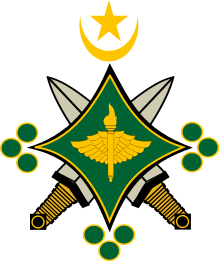 Emblem of the Mauritanian Armed Forces | |
 Flag of the Mauritanian Armed Forces | |
| Service branches | Mauritanian National Army Mauritanian National Navy Mauritania Islamic Air Force[1] |
| Headquarters | Nouakchott |
| Website | armee |
| Leadership | |
| President | Mohamed Ould Ghazouani |
| Prime Minister | Mokhtar Ould Djay |
| Minister of Defense | Hanena Ould Sidi |
| Chief of National Army Staff | General Mokhtar Ould Bolla Chaabane |
| Personnel | |
| Conscription | 2 years |
| Available for military service | 718,713[2] males, age 15–49, 804,622 females, age 15–49 |
| Fit for military service | 480,042 males, age 15–49, 581,473 females, age 15–49 |
| Reaching military age annually | 36,116 males, 36,826 females |
| Active personnel | 31,540 personnel, 5,000 para-military[3] |
| Reserve personnel | 66,000 |
| Expenditure | |
| Budget | $231 million (FY2022) |
| Percent of GDP | 3.9% (FY2018) |
| Industry | |
| Foreign suppliers | |
| Related articles | |
| History | Western Sahara War Mauritania–Senegal Border War 2003 Mauritanian coup d'état attempt 2005 Mauritanian coup d'état 2008 Mauritanian coup d'état |
| Ranks | Military ranks of Mauritania |
The Armed Forces of Mauritania (Arabic: الجيش الوطني الموريتاني, romanized: al-Jaysh al-Waṭanī al-Mūrītānī, French: Armée Nationale Mauritanienne[4]) is the defense force of the Islamic Republic of Mauritania, having an army, navy, air force, gendarmerie, and presidential guard. Other services include the national guard and national police, though they both are subordinated to the Ministry of the Interior. As of 2018, the Mauritanian armed forces budget was 3.9% of the country's GDP.
The military forces of Mauritania are listed by the IISS Military Balance 2007 as comprising 15,870 personnel with an additional 5,000 paramilitaries, in the national gendarmerie.[3] The Navy (Marine Mauritanienne) has 620 personnel and 11 patrol and coastal combatants, with bases at Nouadhibou and Nouakchott. The CIA reports that the navy includes naval infantry. The small Air Force (Force Aérienne Islamique de Mauritanie, FAIM) has 250 personnel, 2 FTB-337 aircraft, 15 transport aircraft of various types, and 4 SF-260E trainers. The 5,000 paramilitaries are divided in the National Gendarmerie (3,000), and the National Guard (2,000) who both report to the Ministry of the Interior. Other paramilitary services reported by the CIA in 2001 include the National Police, Presidential Guard (BASEP).[5]
History

Saleh Ould Hanenna, a former army major, led the 2003 Mauritanian coup d'état attempt in June 2003. It aimed to overthrow President Maaouya Ould Sid'Ahmed Taya. He commanded a rebel section of the Army during two days of heavy fighting in Nouakchott. With the failure of the coup Hanenna initially escaped capture, and formed a group called the 'Knights of Change' with Mohamed Ould Cheikhna, but they were arrested on 9 October 2004.[6]
General Mohamed Ould Abdel Aziz, a career soldier and high-ranking officer, was a leading figure in the 2005 Mauritanian coup d'état that deposed President Maaouya Ould Sid'Ahmed Taya.[7][8]
In August 2008, General Ould Abdel Aziz led the 2008 Mauritanian coup d'état that toppled President Sidi Ould Cheikh Abdallahi. Following the latter coup, Abdel Aziz became President of the High Council of State as part of what was described as a political transition leading to a new election.[9] He resigned from that post in April 2009 to stand as a candidate in the July 2009 presidential election, which he won. He was sworn in on 5 August 2009.[10]
Army
In March 1985, the Defense Intelligence Agency reported the army was 8,300 strong with no reserves (Military Intelligence Summary – Africa South of the Sahara, DDB 2680-104-85, ICOD 15 October 1984, Mauritania pages 4, 5, declassified by letter dated 29 April 2014). Reported regions at the time were Region I – Nouadhibou, Region II – Zoueirat, Region III – Atar, Region IV – formerly at Tidjikdja, which no longer existed, Region V – Nema, Region VI – Nouakchott, and Region VII – Rosso. The army was organized into the six regions which each supervised several companies, though there was 'one small autonomous infantry battalion stationed in Nouakchott.'
The Army is 15,000 strong, according to the IISS, with six military regions, two camel corps battalions, one battalion of T-55 battle tanks, one armored reconnaissance squadron, eight garrison infantry battalions, seven motorized infantry battalions, one commando/para battalion, 3 artillery battalions, 4 air defense batteries, one engineer company, and one guard battalion.[3] The 1ère région militaire is at Nouadhibou, 2nd Military Region is at Zouerate, 3rd Military Region is at Atar, 4ème région militaire may be at Tidjikdja, 5th Military Region headquarters is at Néma,[11] The 6th Military Region may be in the area of the capital, and the 7th Military Region may be at Aleg.[12]
The Mauritanian military is currently involved in Operation Enduring Freedom – Trans Sahara. Previous U.S. anti-terrorist engagement included training under the Pan Sahel Initiative. Under the PSI, a 10th Special Forces Group training team carried out a one-week border monitoring training programme in January 2004.[13]
The IISS listed equipment in 2007 as including 35 T-55 main battle tanks, 70 reconnaissance vehicles (20 Panhard AML-60, 40 Panhard AML-90, 10 Alvis Saladin), 25 wheeled APCs (estimate 20 Panhard M3 and 5 Alvis Saracen), 194 artillery pieces (80 towed: 36 HM-2/M-101, 20 D-30, 24 D-74; 114 mortars: 60 60-mm, 30 Brandt 120-mm), 24 MILAN ATGM, 114 recoilless rocket launchers (est. 90 M-40A1 106mm, est 24 M-20 75mm), est 48 RPG-7 Knout, 104 SAMs (est 100 SA-7 Grail, and a reported 4 SA-9 Gaskin), and 82 towed anti-aircraft guns (14.5mm, including 12 ZPU-4, ZU-23-2, 37 mm automatic air defense gun M1939 (61-K), 12 57 mm AZP S-60, and 12 100mm KS-19s).[14]
Equipment
Among reported special forces units are:
- 1er Bataillon de Commandos Parachutistes (1er BCP)
- 2eme Bataillon de Commandos Parachutistes (2eme BCP)
- Bataillon de la Securite Presidentielle (BASEP)
- Bataillon Special d'Intervention (BSI)
- Group Special d'Intervention (GSI)
Air Force
After achieving independence in 1960 the Faidem's (Force Aerienne Islamique de Mauritanie) was supplied equipment by France, such as C-47s and MH.1521 Broussards, which was later replaced by the Britten-Norman BN-2A Defender between 1976 and 1978 and had operated as a transport and observation squadron in the Western Sahara War.[24] During the same time two Cessna 337s and two DHC-5 Buffalo STOL transports were supplied in 1977 and 1978 with one DHC-5 crashing almost immediately and the other being returned to De Havilland Canada in 1979. After the Polisario Front shot down one Defender and damaged two in 1978 the Mauritanian government ordered six IA-58 Pucarás for ground attack duties from Argentina; this order was later cancelled after a Mauritanian military coup.
The Air Force School was created in Atar. It was founded to train pilots, mechanics, other crewmen for the Air Force.[25]
More recent procurements have been from China in the form of the Harbin Y-12 II turboprop transports were delivered in September 1995, one crashed in April 1996. A second one crashed on 12 July 2012.[26] The Xian Y7-100C (a copy of the AN-24 transport) was delivered from October 1997, which crashed in May 1998. The Air Force has recently received their order of Embraers.
Aircraft


| Aircraft | Origin | Type | Variant | In service | Notes | |
|---|---|---|---|---|---|---|
| Combat aircraft | ||||||
| EMB 314 Super Tucano | Brazil | COIN | more than 4 | |||
| Maritime patrol | ||||||
| BN-2 Islander | United Kingdom | Maritime patrol | 3[27] | |||
| Cessna 208 | United States | Maritime patrol | 2 | 1 on order[27] | ||
| Piper PA-31 | United States | Maritime patrol | 2[27] | |||
| Transport | ||||||
| Basler BT-67 | United States | Transport/Utility | 1[27] | Modified Douglas DC-3 with P&W PT6A Turboprop engines | ||
| Cessna 441 | United States | VIP transport | 1[27] | |||
| Pilatus PC-6 | Switzerland | Utility | 1[27] | |||
| Harbin Y-12 | China | Transport | 1[27] | |||
| Helicopters | ||||||
| Harbin Z-9 | China | Utility | 2[27] | |||
| AgustaWestland AW109 | Italy | Utility | 2[27] | |||
| MD-500[23] | United States | Utility | 4 | |||
| Trainer aircraft | ||||||
| EMB-312 | Brazil | Trainer | 4[27] | |||
| SIAI-Marchetti SF.260 | Italy | Trainer | 4[27] | |||
Navy
Mauritania has developed a five-year plan to develop its navy into a force that is capable of defending the country's 235,000 km squared exclusive economic zone, Admiral Isselkou Ould Cheik El-Weli said during a promotion ceremony held at the Nouadhibou naval base in late May 2017. The Saharamedias.net website reported that the plan includes the acquisition of two 60-meter vessels, which are currently under construction, and "mid-sized ships", as well as the formation of three companies of marines. No further details were provided.[28]
The Mauritanian Navy was created on 25 January 1966, after the extension of Mauritania's territorial waters from 12 to 30 nautical miles (22 to 56 kilometres). By 1972 the navy had one small patrol gunboat and two small patrol craft that performed port control and customs duties. In 1987 the navy had thirteen boats. Of these boats, only eight were seaworthy, and the navy could send only two vessels out to open water at a time. Mauritania's exclusive economic zone (EEZ) extended 200 nmi (370 km) out from the coast, but even if effective coastal surveillance were possible, the navy's vessels would not be able to control Mauritania's waters. Nouadhibou housed the major naval base; Nouakchott housed a secondary base.[29]
Ship inventory

| Vessel | Origin | Type | In service | Notes |
|---|---|---|---|---|
| LIMAM EL HADRAMI | China | Patrol boat | Obtained in 2001 | |
| TIMBEDRA | China | Patrol boat | Obtained in 2016 . CMS from France (LYNCEA CMS) | |
| GORGOL | China | Patrol boat | Obtained in 2016. CMS from France (LYNCEA CMS) | |
| Abourbekr Ben Amer | France | Patrol boat | Obtained in 1992 | |
| El Nasr | France | Patrol boat | 1[30] | Patra-class |
| Z'bar | Germany | Patrol boat | 1[30] | Neustadt-class |
References
- ^ "CIA World Factbook: Mauritania". 14 December 2021.
- ^ "The World Factbook". 14 December 2021.
- ^ a b c IISS Military Balance 2007, pp. 235–6
- ^ "ARMEE". ARMEE.
- ^ Central Intelligence Agency, The World Factbook, 2001
- ^ "MAURITANIA: Government arrests mastermind behind coup plots", IRIN Africa, 12 October 2004.
- ^ "Mauritania coup: New president named". Al Jazeera. Retrieved 21 November 2023.
- ^ "Mauritanie – Ould Taya appelle « ses forces à intervenir » La junte militaire à Nouakchott confirme ses intentions démocratiques". L'Orient-Le Jour (in French). 9 August 2005.
- ^ "Le Haut Conseil d'Etat rend public un nouveau communiqué" Archived 12 August 2008 at the Wayback Machine, AMI, 7 August 2008 (in French).
- ^ "Mauritarian coup leader sworn in as president", AFP, 5 August 2009.
- ^ "Mauritanie : L'expert militaire mauritanien Mohamed Salem Ould Haiba à El Houriya". Archived from the original on 23 July 2011.
- ^ "La 7ème région militaire célèbre le cinquantenaire de la création de l'Armée nationale". Archived from the original on 16 March 2012. Retrieved 2 January 2011.
- ^ Jane's Defence Weekly, 21 January 2004, p.19
- ^ a b c d e f g h i j k l IISS 2007, p.236
- ^ Pézard, Stéphanie (June 2010). "Arms in and around Mauritania – National and Regional Security Implications" (PDF). Small Arms Survey. Archived from the original (PDF) on 12 January 2011. Retrieved 13 October 2010.
- ^ a b c Jones, Richard D.; Ness, Leland S., eds. (27 January 2009). Jane's Infantry Weapons 2009/2010 (35th ed.). Coulsdon: Jane's Information Group. ISBN 978-0-7106-2869-5.
- ^ Pézard, Stéphanie (June 2010). "Arms in and around Mauritania – National and Regional Security Implications" (PDF). Small Arms Survey. p. 32. Archived from the original (PDF) on 12 January 2011. Retrieved 13 October 2010.
- ^ Gander, Terry J. (2000). "National inventories, Mauritania". Jane's Infantry Weapons 2001–2002. p. 3103.
- ^ Bonn International Center for Conversion. Simonov SKS (PDF) (Report). SALW Guide: Global distribution and visual identification. p. 3. Archived (PDF) from the original on 13 July 2018. Retrieved 13 July 2018.
- ^ a b c d e f "Arms in and around Mauritania" (PDF). Small Arms Survey. 2018. Archived from the original (PDF) on 12 January 2011. Retrieved 13 October 2010.
- ^ Gander, Terry J. (22 November 2000). "National inventories, Mauritania". Jane's Infantry Weapons 2001–2002.
- ^ Jenzen-Jones 2017, p. 34.
- ^ a b c d e f g h i j k "Mauritania Land Forces military equipment and vehicles Mauritanian Army".
- ^ World aircraft information files Bright Star Publishing London File 337 Sheet 4
- ^ Super Administrateur. "The Directorate of Air". Archived from the original on 6 December 2017. Retrieved 31 July 2014.
- ^ "CORRECTED-OFFICIAL-Kinross chartered plane crashes in Mauritania, 7 dead". Reuters. 12 July 2012.
- ^ a b c d e f g h i j k "World Air Forces 2018". Flightglobal Insight. 2018. Retrieved 5 January 2018.
- ^ "Mauritanian Naval Expansion Revealed".
- ^ "Mauritania — The Navy".
- ^ a b Trade Registers. Armstrade.sipri.org. Retrieved on 8 January 2018
Works cited
- Jenzen-Jones, N.R. (January 2017). Global Development and Production of Self-loading Service Rifles: 1896 to the Present (PDF). Working Paper 25. Small Arms Survey. ISBN 978-2-940548-34-7. JSTOR resrep10728. Archived from the original (PDF) on 29 June 2017.





